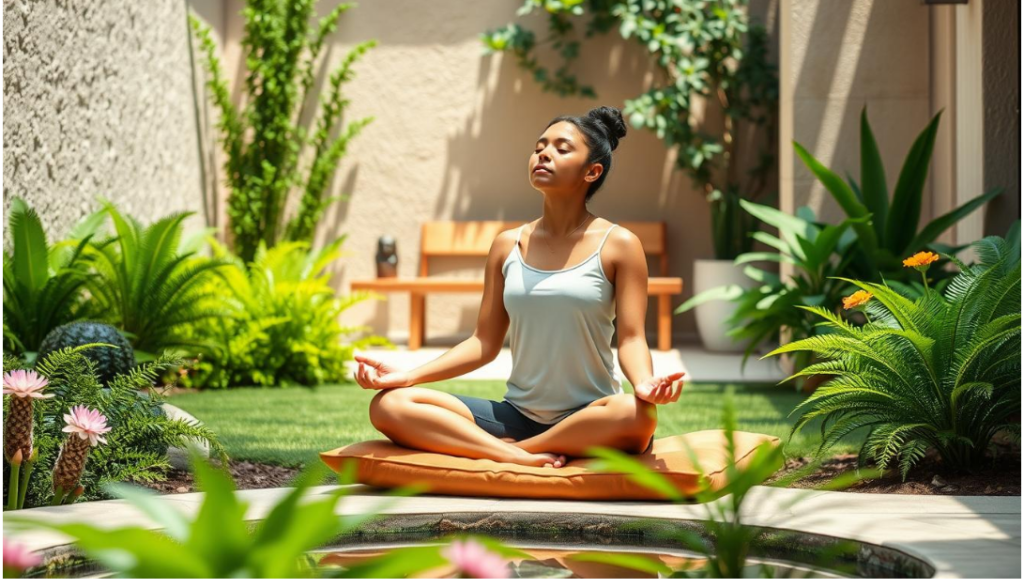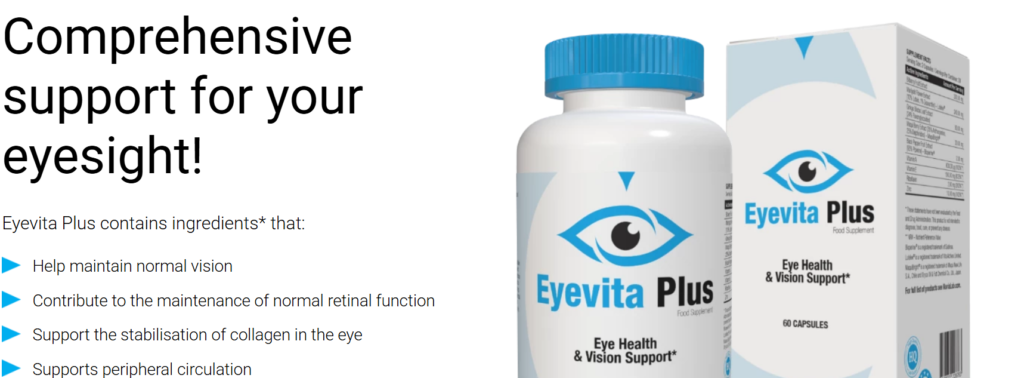Boost Your Wellbeing: Mental Health & Fitness Tips

In today’s fast world, knowing about mental health and fitness is key. The mind-body link affects our daily lives a lot. It’s important to keep both mental and physical health in balance.
This article will share useful tips and info. It aims to help you improve your mental and physical health. This way, you can live a more balanced life.

A serene, sun-dappled meadow where a person sits cross-legged in a meditative pose, their eyes closed and an expression of calm tranquility. In the foreground, a pair of running shoes and a water bottle suggest a balance of physical and mental wellbeing. The middle ground features lush, verdant foliage and a gently flowing stream, creating a sense of harmony and connection with nature. The background showcases a picturesque mountain range bathed in soft, golden light, evoking a sense of peaceful contemplation. The overall scene conveys a holistic approach to mental health and fitness, where the mind and body are in sync, nourished by the beauty and serenity of the natural world.
Key Takeaways
- Mental health and fitness are interconnected and vital for overall wellbeing.
- The mind-body connection plays a significant role in improving life quality.
- Practical strategies can enhance both mental wellness and physical health.
- Regular exercise is a powerful tool for mental clarity and emotional stability.
- Building healthy habits can lead to a more balanced and fulfilling life.
The Importance of Mind-Body Connection
The link between our minds and bodies is key to feeling good. Knowing how they connect can make life better. Keeping our minds and bodies in balance helps us feel strong and happy.
Learning how they work together shows us how to be healthier and happier.
Understanding the Link Between Mental and Physical Health
Studies show our minds and bodies are closely tied. Stress and worry can hurt our health. But, moving our bodies can clear our minds and make us feel better.
By taking care of both, we can live a healthier life.
How Exercise Impacts Mental Wellness
Working out regularly is great for our minds. Running, yoga, or swimming makes us feel happy and less stressed. People who exercise often feel less anxious and depressed.
What is Mental Health and Fitness?
Mental health and fitness cover a wide range of emotional and psychological well-being. They greatly affect our daily lives. It’s key to understand these concepts for emotional balance.
Mental wellness is more than just not being sick. It’s about reaching our full potentials, handling daily stress, and helping others. Seeing the link between mental health and fitness helps us care for our whole health.
Defining Mental Health and Physical Well-Being
Mental health deals with how we think, feel, and act. Physical well-being is about exercise, eating right, and sleeping well. Together, they boost mental wellness and emotional balance.
This mix helps us face life’s ups and downs better.
Debunking Common Myths
There are many wrong ideas about mental health and fitness. One big myth is that mental health issues mean you’re weak. But, anyone can face these challenges, no matter how strong they are.
Talking about mental health helps us understand it better. It also encourages us to seek help when we need it. Another myth is that improving mental fitness takes a lot of time and effort. But, small steps every day can make a big
Essential Mental Health Tips for Everyday Life
Keeping your mind healthy means doing small things every day. Being thankful can really help. It makes us see the good things in life. This simple act can make a big difference in how we feel.
Practicing Gratitude and Positivity
Try keeping a gratitude journal. Write down three things you’re thankful for each day. It makes you feel better and less stressed. Studies show it makes people happier and more emotionally well.
Avoiding Negative Self-Talk
Being too hard on yourself is bad for your mind. You need to notice and change it. Start by spotting negative thoughts and replacing them with positive ones. Say “I can do this” instead of “I can’t.” This helps you feel more confident and strong.
Physical Activities that Promote Mental Wellness
Doing physical activities is key for good mental health. Exercise makes us feel better, think clearer, and feel emotionally stable. Certain exercises help fight anxiety and depression. Knowing the right workouts helps us find peace and balance.
Benefits of Regular Exercise
Regular exercise is great for our minds. It’s not just about being fit. It makes us feel happy and less stressed. It builds strength, makes us feel proud, and helps us deal with tough times.
Types of Workouts for Mental Clarity
There are many workouts to choose from. Aerobic activities like running boost energy and focus. Yoga and tai chi help us relax and think clearly. Mixing up our activities keeps our minds and bodies healthy.
A serene and tranquil outdoor scene, with a person practicing yoga or meditation in the foreground. The middle ground features a lush, verdant landscape with rolling hills and a calming body of water, such as a lake or pond. In the background, mountains or a peaceful forest backdrop creates a sense of natural harmony. The lighting is soft and warm, creating a calming and introspective atmosphere. The composition emphasizes the connection between physical and mental well-being, with the person in the center of the frame finding solace and balance through their mindful practice.
Self-Care Practices to Enhance Your Wellbeing
Starting your journey to better mental health is easy. Just add self-care to your daily life. A regular self-care plan helps you feel more mindful and happy. It’s all about taking time for yourself to feel good.
Create a Daily Self-Care Routine
Having a daily self-care plan is key. Here’s what to include:
- Make time for self-care every day.
- Do physical activities like yoga or jogging.
- Enjoy relaxing hobbies, like reading or gardening.
- Write down things you’re thankful for each day.
Doing these things daily can make you feel better and less stressed. A set routine keeps self-care important, even when life gets busy.
Mindfulness and Meditation Techniques
Mindfulness helps clear your mind and feel calm. Adding these to your day can change your outlook. Try these:
- Guided Meditation: Use apps or websites for guided sessions.
- Deep Breathing Exercises: Just breathe deeply for a few minutes.
- Reflection Time: Think about good things at the end of the day.
These practices help you know yourself better and feel better over time. Adding self-care to your day makes life happier and healthier.
Managing Stress for Improved Mental Health
Managing stress is key for good mental health. Stress can really affect how we feel. Knowing what causes stress helps us take steps to feel better. This can lead to better ways to handle stress and a healthier mind.
Recognizing Stress Triggers
Finding out what makes you stressed is the first step. Common stressors include:
- Work-related pressures
- Financial concerns
- Relationship conflicts
- Health issues
- Life changes and transitions
Knowing what stresses you lets you find ways to deal with it better.
Effective Stress Management Strategies
Using good stress management can really help your mental health. Here are some strategies that work:
- Cognitive Restructuring: Changing negative thoughts to positive ones can help you feel better.
- Relaxation Techniques: Deep breathing, muscle relaxation, and guided imagery can calm your mind.
- Physical Activity: Exercise releases happy chemicals that can lift your mood and reduce stress.
- Time Management: Organizing your tasks and setting realistic goals can make you feel less overwhelmed.
A serene, sun-dappled garden oasis, with a person sitting cross-legged on a plush meditation cushion, eyes closed in deep contemplation. The foreground features lush, vibrant greenery – ferns, flowering plants, and a calming water feature. The middle ground showcases a minimalist wooden bench and a small, ornamental statue. In the background, a textured stucco wall provides a sense of tranquility, while soft, diffused lighting creates a warm, inviting atmosphere. The overall scene exudes a sense of inner peace and mindfulness, perfectly capturing the essence of “Managing Stress for Improved Mental Health”.
Nutrition and its Impact on Mental Health
Nutrition is key to our mental health. What we eat affects our brain and how clear we think. Knowing how food and mental health connect helps us choose better foods for our brains.
Some foods are good for our brains. Drinking enough water is also important for our brain health.
Food for Thought: Best Foods for Mental Clarity
Eating the right foods can make our minds clearer. Foods like salmon, walnuts, and flaxseeds boost brain function. Berries, dark chocolate, and leafy greens protect our brains from harm.
Whole grains like oats and brown rice give us energy. They help us stay focused all day.
Hydration and Brain Function
Drinking water is essential for our brains. Not drinking enough can hurt our thinking and memory. Water helps our brain work well.
Even a little dehydration can make us less sharp. Drinking water helps our brain function better and keeps us mentally healthy.
Building Emotional Balance
Emotional balance is key to feeling good. It helps us deal with life’s ups and downs. Knowing about emotional intelligence is important. It helps us handle our feelings and think before we act.
Being emotionally smart makes our relationships better. It also helps us feel clear in our minds and stay well.
Understanding Emotional Intelligence
Emotional intelligence means knowing our feelings and others’. This knowledge changes how we see the world. It helps us handle stress, understand others, and make smart choices.
People with good emotional intelligence feel more balanced. They have healthier relationships and better mental health.
Journaling for Emotional Awareness
Journaling helps us know our feelings better. Writing down our thoughts and feelings helps us understand ourselves. It lets us see patterns in our actions.
Journaling helps us think about our feelings. It’s a safe place to express ourselves. It helps us discover ourselves and stay mentally clear. Doing it every day can really help our emotional health.
Engaging in Social Activities for Mental Health
Doing social activities is key for better mental health. It helps us feel part of a group and get support. When we connect with friends, we feel happier and less alone.
The Role of Community in Wellbeing
Being in a strong community is very helpful for our minds. It lets us share and support each other. This makes life better and helps us feel safe when things get tough.
Volunteering and its Positive Effects on Mental Health
Volunteering is great for our minds. Helping others makes us feel more important. Studies show it lowers sadness and makes us feel more stable.
Holistic Health Approaches to Wellbeing
Using a holistic health approach can really help your mind. Adding mindfulness to your day helps you stay strong. It makes you feel calm and present.
Simple steps can make a big difference. They help you deal with daily life better.
Integrating Mindfulness into Daily Life
Mindfulness in daily life boosts your mental health. Here are some ways to do it:
- Start the day with mindful breathing exercises to set a positive tone.
- Engage fully during meals, savoring each bite and minimizing distractions.
- Practice gratitude journaling each evening to reflect on positive experiences.
- Take mindful walks in nature to connect with the environment.
Alternative Therapies for Mental Strength
Alternative therapies can also help your mental health. They work well with traditional methods. Some notable ones are:
| Therapy | Description | Benefits |
|---|---|---|
| Acupuncture | A traditional Chinese medicine technique that uses needles to stimulate specific points on the body. | Reduces anxiety, improves mood, and promotes relaxation. |
| Aromatherapy | The use of essential oils to enhance physical and emotional health through scent. | Creates calming effects, alleviates stress, and boosts mental clarity. |
| Art Therapy | A creative therapeutic approach utilizing art to express emotions and thoughts. | Enhances self-awareness, improves emotional regulation, and fosters a sense of accomplishment. |
Conclusion
As we wrap up our look at mental health and fitness, it’s key to stress how important they are together. Improving mental health is a big job. It needs things like exercise, taking care of yourself, eating right, and being with others.
Each part helps us feel better overall. This shows that we need a balanced way to live a healthier, happier life.
In this article, we talked about many ways to improve wellbeing. We learned how mental and physical health are connected. We also found out how daily self-care and social activities can help.
These tips can really make your life better. They can help you feel happier, less stressed, and more in touch with your feelings.
Improving mental health and fitness is a long-term effort. It needs your dedication and a desire to learn. By using the tips we shared, you can start making big changes.
Keep learning and using these ideas to improve your wellbeing. Remember, the journey to better health is just as important as reaching your goal.
FAQ
What is the relationship between mental health and fitness?
Mental health and fitness are very connected. Working out regularly can make you feel better by releasing happy chemicals. This helps lower stress and makes you feel more balanced.
How can I practice self-care in my daily routine?
Adding self-care to your day can really help your mental health. Start with mindfulness and meditation. Also, make sure to rest, eat well, and do things that make you happy.
What types of exercises are best for mental wellness?
Activities like running, yoga, and mindfulness workouts are great for your mind. They can make you feel happier, less stressed, and more focused. These are good choices for your mental health.
How does nutrition affect my mental health?
What you eat is very important for your mind. Eating foods with omega-3s, antioxidants, and whole grains helps your brain. Also, drinking water is key for staying sharp and focused.
What are some effective stress management strategies?
To manage stress, know what makes you stressed and find ways to deal with it. Mindfulness helps by keeping you in the moment and reducing worry.
How can journaling enhance my emotional awareness?
Journaling helps you understand your feelings better. It lets you see patterns in your life. This can lead to better emotional balance and mental health.
Why is community engagement important for mental health?
Being part of a community is good for your mind. It makes you feel connected and less lonely. Activities and volunteering can make you feel happy and fulfilled.
What are holistic health approaches to enhance wellness?
Holistic health means taking care of your whole self. Mindfulness, meditation, and other therapies help build mental strength. They treat you as a whole person, not just your symptoms.
Leave a Reply
You must be logged in to post a comment.

















Hi, this is a comment.
To get started with moderating, editing, and deleting comments, please visit the Comments screen in the dashboard.
Commenter avatars come from Gravatar.